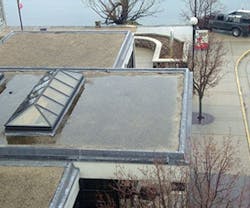Record cold, several inches of rain overnight, damaging winds, regional power failures, building collapse from accumulated snow, or plugged drains.
It’s one thing to read about such things in the local newspaper, but quite another when it affects your building and its occupants.
How to Prepare
The secret to successful roof management begins with an assessment of existing roofs and their condition. This could be performed by skilled in-house personnel or an outside roof consulting firm.
Many years ago, the Corps of Engineers developed a roof management program called ROOFER to provide a uniform basis for evaluating existing roof systems. ROOFER also permitted setting priorities where critical use is involved. The Corps also updated their Unified Facilities Criteria (Roofing) in May 2012.
The audit of your roofs may reveal that your in-house maintenance staff is ill-prepared for a roofing emergency. While some of your staff might be familiar with the older bituminous roofing systems and have maintained an inventory of patching materials, they might well lack familiarity with the newer single ply and spray-in-place polyurethane roof systems.
Your maintenance program should include semi-annual inspections, plus new inspections after there has been construction activity on your roofs or new equipment (or photovoltaics) has been installed over your existing membranes.
PageBreakTraining
Richard (Dick) L. Fricklas was technical director emeritus of the Roofing Industry Educational Institute prior to his retirement. He is co-author of The Manual of Low Slope Roofing Systems, and continues to participate in seminars for the University of Wisconsin and RCI Inc., the Institute of Roofing, Waterproofing, and Building Envelope Professionals. His honors include the Outstanding Educator Award from RCI, William C. Cullen Award and Walter C. Voss Award from ASTM, the J. A. Piper Award from NRCA, and the James Q. McCawley Award from the MRCA. Dick holds honorary memberships in both ASTM and RCI Inc.
Building personnel, including building managers, need to have an in-depth understanding of the building envelope that protects their workplace. Communication with in-house personnel and outside contractors requires a common language.If in-house personnel are new to their positions, attending the programs offered by RCI, Inc. Click here to find subjects and schedules. Key personnel should also be encouraged to attend roofing trade shows.
An Entirely Different Approach
Another option is to prequalify a reputable roofing contractor and hire that contractor to fill both the maintenance and emergency response roles.
Ultimately, no matter how hard a building manager tries to delegate roofing responsibility, he or she is accountable. In the case of embracing single-source roof management, questions will arise as to the cost effectiveness vs. competitive bidding. In order to defend single sources, managers must have a deep understanding of what the options are and whether the decisions made are the best for their firm.
Manage Now or Pay Later
Roof asset management programs aren’t just smart – they’re essential.
Mastics, Coatings, and Adhesives for Roof Repairs
The most sustainable roofing system is a repairable one.
Conflicting Claims Based on Lifecycle Analysis of Roofing
How is a roof’s lifecycle calculated?
About the Author
Richard L. Fricklas
Richard (Dick) L. Fricklas received a Lifetime Achievement Award and fellowship from RCI in 2014 in recognition of his contributions to educating three generations of roofing professionals. A researcher, author, journalist, and educator, Fricklas retired as technical director emeritus of the Roofing Industry Educational Institute in 1996. He is co-author of The Manual of Low Slope Roofing Systems (now in its fourth edition) and taught roofing seminars at the University of Wisconsin, in addition to helping develop RCI curricula. His honors include the Outstanding Educator Award from RCI, William C. Cullen Award and Walter C. Voss Award from ASTM, the J. A. Piper Award from NRCA, and the James Q. McCawley Award from the MRCA. Dick holds honorary memberships in both ASTM and RCI Inc.

